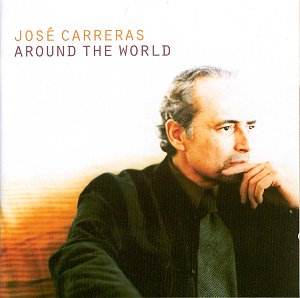Sounding phonetically confident singing in languages
other than his own Spanish (and possibly Italian) is not José
Carreras's strong point. Hearing him sing in your own language can be
either toe-curling or endearing depending on what you think about him
(although I admit there are some I know who go weak at the knees just
at the sound of his voice, irrespective of what he is singing, which
helps to explain the disc. More of that later).
It is ironic then that José has produced an
offering with a global "songs of the world" theme in which he sings
in half a dozen languages. But things are not always what they seem.
A perverse logic at work has him singing both a Polish song and an English
one in Italian and a Russian one in Spanish. He tackles Japanese and
Chinese songs in the original, at least I think he does. Greensleeves
stays in English which is not necessarily a good thing, or maybe
it doesn't matter.
These songs are, one assumes, well known in their native
countries although the booklet is uninformative on this point. Each
song is listed with credits for producer, publisher, music, lyrics ,
arranger and conductor - nothing else. However, from this it is possible
to work out, for example, that a song called Hine e Hine with
music and lyrics by Princess Te Rang Pai is being sung in Chinese and
listening to it seems to confirm that- although I wouldn’t swear to
it.
The stars of the show are the arrangers John Cameron
(who takes the majority), Christian Kolonovits and Frank Peterson. They
mostly conduct their own efforts. Custom made for the occasion, a consistency
of style is ensured which seems to be aiming at making them all sound
the same although minor variation is provided by a tinkling piano here,
a throbbing electric guitar there and in the opening Hymne á
l’Amour a celestial choir supplied, would you believe, by the Crouch
End Festival Chorus. Even the speeds are ironed out so that they nearly
all go at a similar pace – medium slow. The skilfully wrought romantic
slush stylistically dominates so that even distinguished tunes like
Greensleeves start to lose their identity and any national idiomaticisms
of the original songs get well banished. Fronted by unquestionably one
of the world's great tenor voices ably accompanied by the Vienna Symphony
Orchestra, the disc is a triumph of lowest-common-denominatorism.
By all accounts José Carreras is sincere about
taking steps to target as wide an audience as possible on a global basis
and enjoys doing this sort of thing. Previous discs such as My Romance,
Passion and Pure Passion, more or less in the pop classic
domain, have helped to achieve the goal. With this disc he reaches new
heights (or a low, depending on the elevation of your own vantage point).
I am not an expert in these marketing matters but I suspect this will
carry him, certainly in Britain, into Des O'Connor country where, no
doubt, rich pickings are to be made.
I tried very hard to enjoy the music for what it is
and wasn’t doing too badly until I began to wilt at no.15 on the Island
in the Sun. Bring back Harry Belafonte I cried.
A great deal of skill and professionalism has gone
into this production and it must have been an extremely expensive undertaking.
Nevertheless, the returns on the investment are no doubt assured thanks
to the brand name "Carreras". I expect to hear it piped into
my local swimming pool changing room before long.
John Leeman

